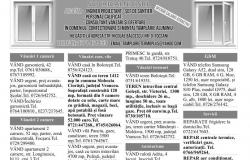Romania will be one of the biggest beneficiaries of the Social Fund for Climate, which will create a significant opportunity to reduce the rate of energy poverty at the national level, according to a press release from the Romanian Energy Poverty Observatory (ORSE), reports Agerpres.
Thus, Romania will receive 9.25% (6 billion euros) of the financing package worth 65 billion euros of the Social Fund for Climate, available in the period 2026-2032.
“The financing instrument is intended to mitigate the potential negative effects on households generated by the introduction of the carbon tax mechanism ETS 2. This new mechanism for taxing fossil fuels used for heating homes and in road transport will be applied in the EU from 2027. The funds will should be used for investments that support vulnerable groups, citizens in energy or transport poverty”, reports the Center for the Study of Democracy (CSD), the initiator of the Romanian Energy Poverty Observatory (ORSE), in a report on the effects of the application of ETS 2 on the countries from the region, published on Friday.
The report “Identification of vulnerability to ETS 2 in the region of Central and Eastern Europe based on the example of Romania and Poland. Recommendations for social climate plans” was carried out by CSD, together with non-governmental organizations from Poland (WiseEuropa) and Germany (Adelphi, Berlin), the release states.
According to the report, the member states of Central and Eastern Europe need special attention in the context of the application of ETS 2 and the Social Fund for Climate. They have their own patterns of energy and transport vulnerabilities. Lower incomes than the EU average, a large stock of old and energy-inefficient buildings and reliance on polluting fuels for heating are all common features across the region. Moreover, in these countries, a large part of the population still lives in rural areas, in thermally inefficient houses, without the financial resources to insulate them and trapped in the use of inefficient heating fuels. All this leads to high levels of energy poverty.
“In Romania, households that use gas-based devices for home heating and are already energy poor will be the most vulnerable to ETS 2. However, other types of households will also be indirectly impacted by the ETS 2 system. Therefore, a big stake is to develop programs adapted to the energy needs of households with low and medium incomes that are vulnerable to any price increases. These households are already precarious or at high risk of energy poverty, if they will not benefit from long-term interventions. One of the most important tasks for the authorities in the coming period is to identify and profile the households that will be most affected. This 6 billion euro financing from which Romania will benefit will create a major opportunity to reduce the high rate of energy poverty recorded at the national level, if the vulnerable categories of consumers are correctly identified”, said Andreea Vornicu, researcher at the Center for the Study of Democracy and co-author of the study, quoted in the press release.
In order to access the money available through the Social Climate Fund, the beneficiary states must develop, by mid-2025, clear and comprehensive action plans, which identify households vulnerable to the increase in energy bills, as well as vulnerable transport users.
The investments will aim at: decarbonizing the heating and cooling systems of buildings or reducing the energy used by buildings, including the integration of renewable sources; accelerating the adoption of zero-emission mobility, including refueling and recharging infrastructure, the transition to the use of public transport and the development of multiple means of transport; measures to provide financial support to low-income households in the worst energy-performing buildings and to address the social impact of the ETS 2 carbon price on low- and middle-income transport users.
ORSE reports that, in Romania, 37% of households were in energy poverty in 2022, after spending more than 10% of their income on energy bills (electricity and heating), according to CSD modeling based on data contained in The survey of family budgets carried out by the National Institute of Statistics. Therefore, any additional increase in natural gas prices, such as that generated by ETS 2, would bring an additional cost that will be reflected in energy bills. Thus, at a cost of 70 euros/ton of CO2, the total expenses of a household will increase by up to 5%, according to the estimates included in the report published on Friday by CSD.
For those on average incomes, the additional expenditure will be largely related to heating. Households in the top two income deciles (thresholds) are the least affected, as these households mainly use wood for heating, a fuel that is not included in ETS 2. However, these households will be indirectly affected, as any increase in the price of gas will lead to an increase in demand and, therefore, to an increase in prices for alternative fuels, including wood. This effect was recorded in Romania in the winter of 2021/2022, when wood prices rose and government attempts to mitigate the effects remained ineffective (the ceiling price of legal wood led to an increase in prices on the unregulated market).
Middle-income households will be mostly directly affected by ETS 2, because these are the households that do not have much economic leverage and every change in prices directly affects their incomes. In addition, these households cannot afford large investments and need government support for switching to low-carbon heating options, building modernization and other long-term measures.
Regarding transport, the biggest impact, around 4% on total expenses, would be felt by households in the highest income deciles, according to the report published by CSD. This result is consistent with the fact that high-income households tend to use personal cars for daily commuting more than low- and middle-income households. However, special attention should be paid to the mobility of consumers in the top income deciles, where low impact may hide limited mobility and the need for better public transport infrastructure and services.
The report includes a series of recommendations for a good implementation of the reforms at the national level: the identification of vulnerable households that will be directly and indirectly affected by ETS2; the development of personalized policies, with an emphasis on thermal rehabilitation programs, including for the rural population and households with medium incomes; the development of a working structure at governmental level that can coordinate the design and implementation process of the social climate plan; strengthening the administrative capacity of the relevant national and local authorities; organizing consultations on social climate plans as soon as possible, involving a wide range of stakeholders, to increase social awareness and commitment to make the best use of funds; ensuring the transparency of the payment of funds and an effective mechanism for monitoring their use.
The report “Identification of vulnerability to ETS 2 in the region of Central and Eastern Europe based on the example of Romania and Poland. Recommendations for social climate plans” was carried out within the project “Facilitating Socially Just Carbon Pricing in Central and Eastern Europe”, part of the European Climate Initiative (EUKI) of the German Federal Ministry for Economic Affairs and Climate Action (BMWK).
The Romanian Energy Poverty Observatory (ORSE) is a project initiated by the Center for the Study of Democracy, a think-tank established in 2006 within the Department of Political Sciences, Faculty of Political, Administrative and Communication Sciences, “Babeş-Bolyai” University in Cluj , within which it functions as an accredited research center.
The aim of this initiative is to provide a 360-degree perspective on energy poverty at the national level, as well as the necessary expertise to combat this complex phenomenon, which affects a large part of the population. ORSE brings together leading experts from various fields relevant to the topic of energy poverty in Romania, in order to identify the best solutions.
Tags: Romania invest billion euros reduce energy transport poverty ORSE
-





